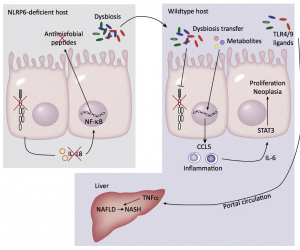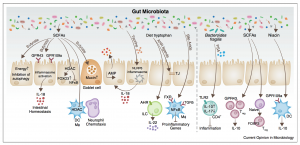Microbiome-Modulated Metabolites at the Interface of Host Immunity
The mammalian gastrointestinal tract and associated mucosal immune system harbor a large repertoire of metabolites of prokaryotic and eukaryotic origin that play important roles in eukaryotic development and physiology. These often bioactive small molecules originate from nutrition- and environmental-related sources, or are endogenously produced and modulated by the host and its microbiota. A complex network of interactions exists between the intestinal mucosal immune system and the microbiota. This intimate cross-talk may be driven by metabolite secretion and signaling, and features profound influences on host immunity and physiology, including the endocrine, metabolic, and nervous system function in health and disease. Alterations in microbiome-associated metabolite levels and activity are implicated in the pathogenesis of a growing number of illnesses. In this review we discuss the origin and influence of microbiome-modulated metabolites, with an emphasis on immune cell development and function. We further highlight the emerging data potentially implicating metabolite misbalance with host-microbiome-associated disease.
Visit full artice page: http://www.jimmunol.org/content/198/2/572.long

